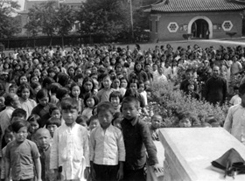Scenes of mutilated bodies, gang rape and cold-blooded slashing make this documentary intensely vile. In this day when many of us only learn about war from textbooks, and play at it using game consoles, it’s truly difficult to comprehend war crimes, atrocities and the inhumanity war veterans have seen.
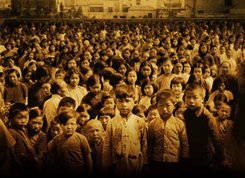 While most people know about the infamous Hitler and his atrocious massacre of about 6 million Jews, also known as the Holocaust, the mayhem of Nanking during the World War II is the lesser known of 2 evils and some of these heinous crimes have seemingly gone unnoticed in certain parts of the world.
While most people know about the infamous Hitler and his atrocious massacre of about 6 million Jews, also known as the Holocaust, the mayhem of Nanking during the World War II is the lesser known of 2 evils and some of these heinous crimes have seemingly gone unnoticed in certain parts of the world.
The documentary was inspired when Producer Ted Leonsis, Vice Chairman of AOL, chanced upon the late Iris Chang’s 1997 award-winning historical book, The Rape of Nanking, and was shocked to find that he knew simply nothing about the event. He was outraged yet sad that such unfathomable brutality could ever occur, and felt that a story should be documented to exemplify how a war affects innocent civilians the most.
Nanking was accepted into the Sundance Film Festival this year and was awarded honors for Documentry Editing with the introspective portrayal of the aftermath of the Japanese invasion of Nanking.
Why rake up the past?
Leonsis has said on the official website,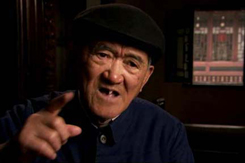 “Our film isn’t an anti-Japanese film. It is an anti-war film.” Helmed by directors Bill Guttentag and Dan Sturman, whose previously collaboration on Twin Towers won the Oscar for Best Documentary Short Subject in 2003, the film focuses on how US missionaries based in Nanking during the WWII worked with German Nazi businessmen to set up a safe zone for Chinese refugees, amid the onslaught by Japanese soldiers.
“Our film isn’t an anti-Japanese film. It is an anti-war film.” Helmed by directors Bill Guttentag and Dan Sturman, whose previously collaboration on Twin Towers won the Oscar for Best Documentary Short Subject in 2003, the film focuses on how US missionaries based in Nanking during the WWII worked with German Nazi businessmen to set up a safe zone for Chinese refugees, amid the onslaught by Japanese soldiers.
The events of the Nanking bloodbath are brought alive through authentic showreels of the fighting scenes, interviews with survivors, and a staged reading of excerpts from journals and letters by a group of actors depicting several Europeans and Americans who helped create the safety zone. Minnie Vautrin, an American missionary (Mariel Hemingway), John Rabe, a German businessman, (Jürgen Prochnow) and Bob Wilson (Woody Harrelson), the only surgeon remaining to care for the victims, were some of the Samaritans. Going through their retrieved journals, one can’t help but applaud their courage and strong sense of justice which probably saved over 200,000 Nanking residents, acoording to insights from several historians.
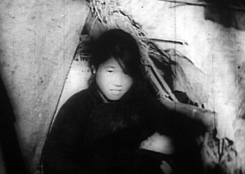 Although soldiers made various attempts to penetrate the border and kill refugees, they faced strong resistance from the 22 Westerners who stood firm and tried their best to fend off the ferocious attackers.
Although soldiers made various attempts to penetrate the border and kill refugees, they faced strong resistance from the 22 Westerners who stood firm and tried their best to fend off the ferocious attackers.
While the gory scenes of rape, forced and body maiming carried out by the Japanese leaves a very bitter aftertaste, the documentary loses some credibility as it provides insights from the Chinese and Western viewpoints but hardly any of the Japanese, making one wonder how balanced this film is.
Despite Leonsis stressing that it isn’t an anti-Japanese film, halfway through, the agenda of this recount seems to be pointed at squarely airing the dirty laundry of the Japanese as hard to stomach scenes of a man forced by the Japanese to have sexual intercourse with a random corpse and images of a dead body being split into half vertically by a bayonet are frighteningly unforgettable and disturbing.
So why recount all these events? Why bring up 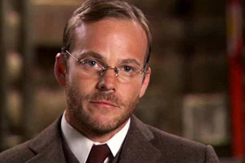 the unhappy past, which after 70 years is still an issue of debate between the 2 nations, and cause a stir when people are still working to bury the hatchet. Maybe like Hotel Rwanda, a similar themed film which highlights how war brings out callousness in people and simply destroys lives, Nanking serves to bring awareness that peace in a country should never be taken for granted and war should always be avoided at all cost. After all, who wants history to repeat itself?
the unhappy past, which after 70 years is still an issue of debate between the 2 nations, and cause a stir when people are still working to bury the hatchet. Maybe like Hotel Rwanda, a similar themed film which highlights how war brings out callousness in people and simply destroys lives, Nanking serves to bring awareness that peace in a country should never be taken for granted and war should always be avoided at all cost. After all, who wants history to repeat itself?
Political agenda?
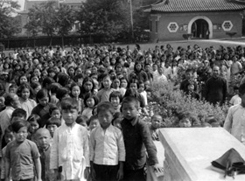 As with all historical or war documentaries, such as, In the Name of the Emperor, which also highlighted The Rape of Nanking, the element of propaganda is always questioned as some Japanese people have labelled Nanking a political setup by the Chinese and inaccurately exaggerated. The Japanese have long disputed the Chinese claims that the killings during Nanking amounted to 300,000, and they have also downplayed the severe war crimes committed.
As with all historical or war documentaries, such as, In the Name of the Emperor, which also highlighted The Rape of Nanking, the element of propaganda is always questioned as some Japanese people have labelled Nanking a political setup by the Chinese and inaccurately exaggerated. The Japanese have long disputed the Chinese claims that the killings during Nanking amounted to 300,000, and they have also downplayed the severe war crimes committed.
Cynicism aside, this film is deeply heart-wrenching and the first-hand accounts from civilians who lived to tell the story pack many tearjerker moments and many hard-hitting lessons for us to learn.
Rating: 4 out of 5 stars
Movie Details:
Opens: Dec 6
Running Time: 90 mins
Language: English
Cast: Mariel Hemingway, Jürgen Prochnow, Woody Harrelson
Director: Bill Guttentag and Dan Sturman

